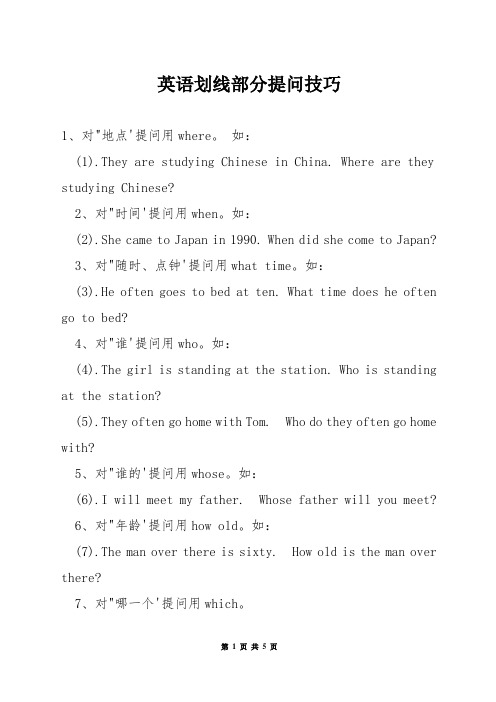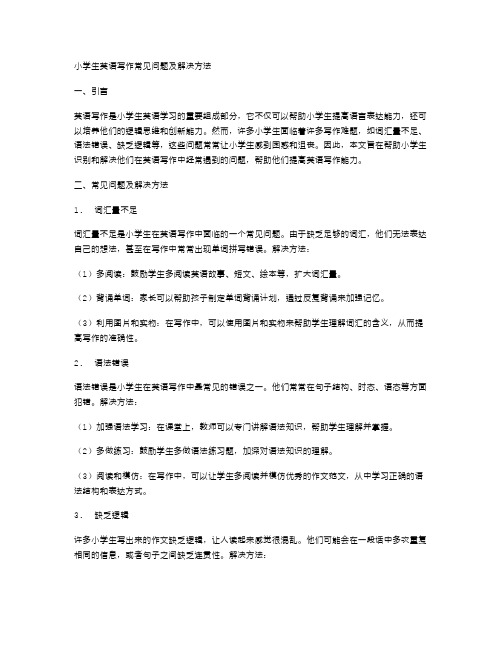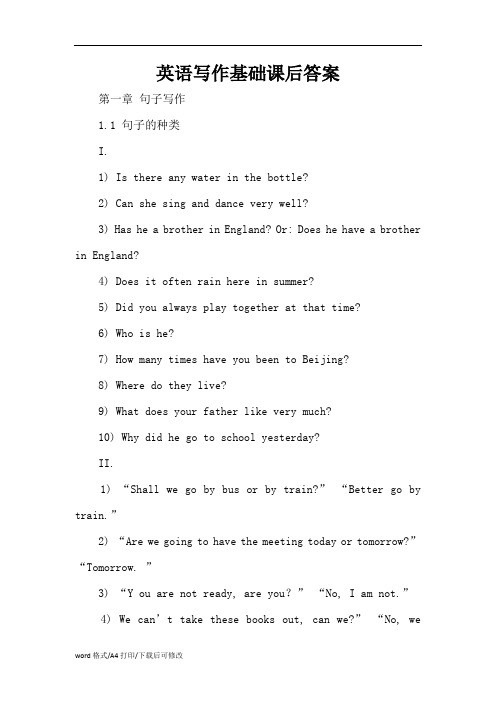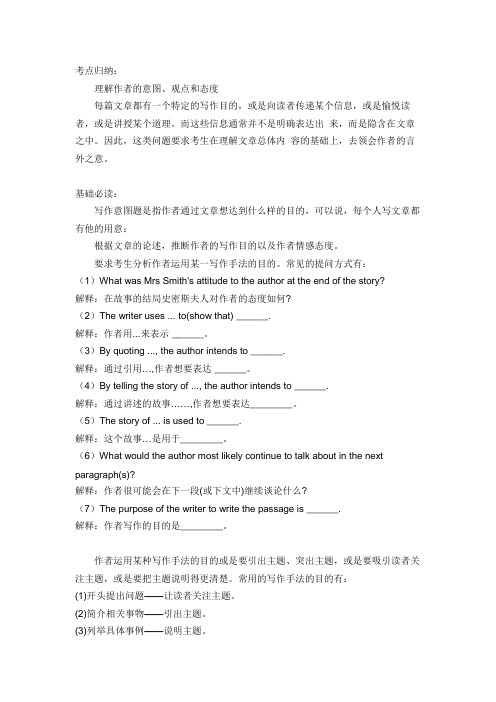英语写作提问方法
英语划线部分提问技巧

英语划线部分提问技巧1、对"地点'提问用where。
如:(1).They are studying Chinese in China. Where are they studying Chinese?2、对"时间'提问用when。
如:(2).She came to Japan in 1990. When did she come to Japan?3、对"随时、点钟'提问用what time。
如:(3).He often goes to bed at ten. What time does he often go to bed?4、对"谁'提问用who。
如:(4).The girl is standing at the station. Who is standing at the station?(5).They often go home with Tom. Who do they often go home with?5、对"谁的'提问用whose。
如:(6).I will meet my father. Whose father will you meet?6、对"年龄'提问用how old。
如:(7).The man over there is sixty. How old is the man over there?7、对"哪一个'提问用which。
2英语学习小窍门1、没有必要做太多的计划,但计划一旦做出,就无论如何要做到。
2、天天记住的最正确单词量应该是在200-300之间。
要对自己有信心,这个数字并不难达到的。
3、克服背单词的恐惧感,尤其是关于长难单词,只要方法得当,它们就一点也不难。
4、掌握一些背单词的好方法。
词根词缀记忆法、联想记忆法、逻辑记忆法无论用哪一种都好,只要能记住单词的,无论拿来用。
小学生英语写作常见问题及解决方法

小学生英语写作常见问题及解决方法一、引言英语写作是小学生英语学习的重要组成部分,它不仅可以帮助小学生提高语言表达能力,还可以培养他们的逻辑思维和创新能力。
然而,许多小学生面临着许多写作难题,如词汇量不足、语法错误、缺乏逻辑等,这些问题常常让小学生感到困惑和沮丧。
因此,本文旨在帮助小学生识别和解决他们在英语写作中经常遇到的问题,帮助他们提高英语写作能力。
二、常见问题及解决方法1.词汇量不足词汇量不足是小学生在英语写作中面临的一个常见问题。
由于缺乏足够的词汇,他们无法表达自己的想法,甚至在写作中常常出现单词拼写错误。
解决方法:(1)多阅读:鼓励学生多阅读英语故事、短文、绘本等,扩大词汇量。
(2)背诵单词:家长可以帮助孩子制定单词背诵计划,通过反复背诵来加强记忆。
(3)利用图片和实物:在写作中,可以使用图片和实物来帮助学生理解词汇的含义,从而提高写作的准确性。
2.语法错误语法错误是小学生在英语写作中最常见的错误之一。
他们常常在句子结构、时态、语态等方面犯错。
解决方法:(1)加强语法学习:在课堂上,教师可以专门讲解语法知识,帮助学生理解并掌握。
(2)多做练习:鼓励学生多做语法练习题,加深对语法知识的理解。
(3)阅读和模仿:在写作中,可以让学生多阅读并模仿优秀的作文范文,从中学习正确的语法结构和表达方式。
3.缺乏逻辑许多小学生写出来的作文缺乏逻辑,让人读起来感觉很混乱。
他们可能会在一段话中多次重复相同的信息,或者句子之间缺乏连贯性。
解决方法:(1)多观察和思考:让学生多观察生活中的事物,思考如何用英语表达出来。
这样可以帮助他们提高观察力和思考能力,从而更好地组织语言。
(2)注重段落结构:在写作教学中,教师可以教授学生如何写好段落结构,如主题句、支持句和结论句等。
通过这种方式,学生可以更好地组织语言,提高作文的逻辑性。
(3)师生互动:教师可以和学生进行互动,对学生的作文进行点评和指导,帮助学生发现问题并改正。
英语阅读理解常见提问方式

职称英语归纳大意部分常见提问方式的中文解释1、.这篇文章的主题思想是。
2、The centra l idea of the passag e is .这篇文章的中心思想是。
3、这篇文章告诉我们。
4、Whichof the follow ing statem entsbest expres ses the main idea of the passag e? 以下哪项陈述最好地表达了文章的主要观点?5、Whichof the follow ing statem entsbest summar izesthe author’smainpoint?以下哪项陈述最好地总结了作者的主要观点?6、Whichof the follow ing best states the themeof the passag e? 以下哪项最好地表述了文章的主题?7、The subjec t matter of this select ion is . 小知识:语法及物动词和不及物动词的区别本文主题的选择是。
英语中按动词后可否直接跟宾语,将动词分为及物动词和不及物动词。
8、The passag e mainly discus ses . 及物动词:后面必须跟宾语意义才完整的实本篇文章主要讨论了。
义动词。
不及物动词:本身意义完整,后面不须跟宾语的实义动词。
9、The passag e illust rates . 不及物动词若要跟宾语,必须在其后添加上本篇文章阐述了某个介词。
如:to,of,at,with,on。
例如:dealswith 论述了……10、The paragr aph center s on .该段的中心思想是。
①passag e [ˈpæsidʒ] n.(文章的)一段;道路;行程②main [mein] adj.主要的;最重要的③statem ent [ˈsteit mənt] n.声明;(思想、观点、文章主题等的)表现;(文字)陈述④expres s [iksˈpr es]vt.表达;快递⑤summar ize [ˈsʌmər aiz]vt.总结,概述⑥author [ˈɔ:θə]n.著作家;作者;创造者;发起人⑦state[steit]vt.规定;陈述,声明⑧theme[θi:m]n.[乐]主题;主旋律;题目,话题;(学生的)作文⑨subjec t [ˈsʌbdʒikt]n.主题,话题;学科,科目;[哲]主观⑩select ion [siˈlekʃən]n.选择,挑选⑪subjec t matter:主题⑫mainly [ˈmeɪnl i:]adv.大部分地;主要地;基本上⑬discus s [disˈkʌs]vt.讨论,谈论;论述,详述;商量⑭illust rate[ˈiləst reit]vt.说明;表明⑮paragr aph [ˈpærəɡrɑ:f]n.段落;分段符号⑯centra l [ˈsentrəl]adj.中心的,中央的;主要的;中枢的11、The paragr aph focuse s on .该段的重点是12、This passag e mainly dealswith . pron.(pronou n)代词[实词] 本文主要论述了v.(verb)动词[实词] (前面名词是单数,所以后面动词加S) vt.(transi tiveverb)及物动词vi.(intran sitiv e verb)不及物动词v.aux.(auxili ary verb)助动词13、The passag e is mainly about.num.(numera l)数词[实词] 这篇文章主要是关于。
写作文继续问问题英语

写作文继续问问题英语Certainly! Here's a structured approach to writing an essay that involves asking questions in English:Introduction:The Socratic method of teaching emphasizes the importance of asking questions to stimulate critical thinking and deeper understanding. Similarly, incorporating questions into essay writing can engage readers and guide them through your thought process. This essay will explore the benefits of using questions in writing and provide strategies for effective implementation.The Role of Questions in Essays:1. Engagement: Opening a paragraph with a question can immediately draw the reader's attention and encourage them to consider the topic from a new perspective.2. Clarification: Questions can clarify complex ideas by breaking them down into smaller, more digestible parts.3. Transition: They can serve as transitions between ideas, guiding the reader from one point to the next.4. Reflection: Asking questions can prompt readers to reflect on their own experiences and opinions, making the essay more interactive.Strategies for Using Questions in Essays:1. Rhetorical Questions: These are questions you don't expectthe reader to answer but are used for emphasis or to make a point.2. Direct Questions: Pose questions directly to the reader to provoke thought or to challenge assumptions.3. Questions as Titles: Use a question as your essay title to pique curiosity and set the tone for the discussion.4. Inquisitive Approach: Frame your essay around a central question that you explore throughout the text.Examples of Questions in Essays:- "What does it mean to be truly free?"- "How can we measure the impact of education on society?"- "Why is climate change still a divisive issue?"The Importance of Balance:While questions can enhance an essay, they should be used judiciously. Overuse can make the essay seem disjointed or appear as if the writer lacks confidence in their arguments.Conclusion:Incorporating questions into your essay writing is a powerful tool for engaging readers and deepening the exploration of your topic. By strategically placing questions throughout your text, you can create a more dynamic and thought-provoking piece of writing.Reflection Questions for the Reader:1. How do you feel about the use of questions in essays?2. Can you think of a situation where a question might not be the best approach to take in an essay?3. What other techniques could be used to engage readers inan essay besides asking questions?By using questions effectively, your essays can become more engaging, thought-provoking, and memorable for your readers. Remember, the goal is not just to ask questions but to use them as a tool to explore ideas, provoke thought, and enhance understanding.。
英语写作基础课后答案(精编版)

英语写作基础课后答案第一章句子写作1.1 句子的种类I.1) Is there any water in the bottle?2) Can she sing and dance very well?3) Has he a brother in England? Or: Does he have a brother in England?4) Does it often rain here in summer?5) Did you always play together at that time?6) Who is he?7) How many times have you been to Beijing?8) Where do they live?9) What does your father like very much?10) Why did he go to school yesterday?II.1) “Shall we go by bus or by train?” “Better go by train.”2) “Are we going to have the meeting today or tomorrow?” “Tomorrow. ”3) “Y ou are not ready, are you?” “No, I am not.”4) We can’t take these books out, can we?” “No, wecan’t ”5) Take care not to catch cold.6) Speak a little slower. I can’t follow you.7) Let ’s not waste our time arguing about it.8) How pretty you are in that skirt!9) What a beautiful city Hangzhou is!10) How I miss my parents!III.1) She has not had her lunch.2) I was too excited to say a ward.3) None of the problems is difficult.4) Y ou can find this kind of mobile phone somewhere.5) He opened the door and we all went in.6) Put on your coat, or you will catch cold.7) It was late, so we went home.8) He doesn’t earn much, but he spends money freely.9) Turn off the light before you leave the room.10) I hope that you will enjoy your stay here.1.2句子的基本句型I .1)SVC 2) SV 3)SVC 4) SVOC 5. SVOA 6) SVO 7) SVOC8) SVOiOd 9) SVOC 10) SVAII.1) My ink has run out. (SV)2) My plan has changed. (SV)3)4)5)6) These flowers smell very sweet. (SVC) The story sounds interesting. (SVC) Y ou should look after your parents. (SVO) They didn’t accept my invitation. (SVO)7) They named the boy jack.(SVOC)8) I saw him come in and go out. (SVOC)9) He offered her his seat / his seat to her. (SVOiOd)10) Jack has caused his family some trouble.(SVOiOd)11) My uncle has sent me a present. (SVOiOd)12) He is sitting by the window.(SAV)13) I went there the day before yesterday. (SVA)14) My mother wants to retire this year.15) David likes singing in the bathroom.1.3句子的统一与连贯I .1) They enjoy reading classic Chinese literature, such as the poetry by Li Bai and Du Fu.2) When I was a little boy, I wanted to become a doctor.3) We got to the airport in time and took the plane.4) I booked the plane tickets and received them two days later.5) He didn’t come yesterday because he was ill.6) Come with me and help me do / with the work.7) If you want to keep healthy, you should spend a little of your free / spare time on regular physical exercise.8) As you are too weak to travel, you should stay at home during the summer vacation.9) Teaching, however, is not so easy as others think. It takes me much time to prepare the lesson. And I often feel a bit tense in class.10) It is difficult to learn English. If we want to havea good command of it, we must study hard.11) John decided to stop smoking. He did not want to die of lung cancer. Or: John decided to stop smoking because he did not want to die of lung cancer.12) It seemed so wonderful that she could speak so easy . But she suddenly paused because she was usually shy.II1) tom is a student who does well in exams, attends classes,reads textbooks, and reviews class notes.2) The teacher told his students to read the story, to write an outline of it and to develop the outline into a summary.3) His speeches were either too long or too short.4) Knowing how to study and learning how to plan time are very important for college students.5) The new flat is not only more economical but also some questions.6) Come to class prepared to take notes and to ask some questions.7) We judge our friends both by what they say and by how they act.8) David was nervous and annoyed because he had lost his keys.9) Some people find swimming more enjoyable than sitting at home reading.10) She is pleased with what you have given and all that you have told her.11) Dentists advise brushing your teeth after each meal and avoiding too much sugar in your diet.12) My uncle spoke with warmth and humor.13) My driving instructor told me to keep both hands on thewheel, to use caution at all time, and not to take my eyes off the road.14) Men ’s clothing styles and women’s clothing styles have grown similar in recent years.15) Credit cards are accepted by department stores, airlines, and some gas stations.1.4句子的扩展I1)(副词)(SV A )2)(现在分词短语)(SVOC )3)(动词不定式短语)(SV A )4)(形容词短语)(SV A )5) (现在分词短语)(SVC )6) (形容词) (SVOiOd)7) (介词短语) (SVA)8) (过去分词短语) (SVOC)9) (介词短语/ 形容词/动词不定式) (SVO)10) (过去分词短语) (SVOA)II.1) (宾语从句)2) (定语从句)3) (状语从句)4) (主语从句)5) (补语从句)6) (主语从句)7) (同位语从句)8) (状语从句)9) (定语从句)10) (宾语从句)1.5 句子的合并I1) Mary can speak Chinese but can’t speak Japanese.2) Mrs. Green took the shopping list on the table and went direct to the supermarket.3) The boy fell down from the tree and hurt his hands and legs.4) You may watch TV at home or go to the football match.5) (Both) Jack and David work in ABC Company.6) They considered and adapt my plan.7) You should speak English not only in class but also out of class. Or: You should speak English both in and out of class.8) The teacher went to the library together with two students.9) You will have to finish either this book or that one.10) He failed to come not because of his illness but because of his unwillingness.II1) Please tell me when you will come here again.2) He is anxious to know whether /if he has passed the exam.3) The fact that the earth goes round the sun is well known.4) The young lady you saw in the dinning room just now teaches us English.5) The old man whose son is in our class like pop songs very much.6) A few students who haven’t realized the value of the book don’t want to use the book as their textbook.7) She is more hard-working than the other students. Or: The other students are not as hard-working as she is.8) If he comes to the meeting, we’ll ask him about it.9) He did many things to please the old man because he hoped the old man would help him.10) As soon as she comes, I will tell her about it.第二章段落写作2.1 段落结构I1)主题主导思想主题主导思想主题主导思想主题主导思想5) Poor handwriting can often get you into trouble.主题主导思想 6) Television can play an educational role in our daily life.主题主导思想主题主导思想主题主导思想9)主题主导思想主导思想II.1) a 2)a 3)b 4) a 5) c 6) a 7) b 8) aIII1) (4) 2.(1), (3) 3. (1)2.2 段落展开1) 定义法 2) 分类法 3) 举例法8) 比较法 4) 列举法 9) 因果法 5) 过程描述法 10) 举例法6) 比较法 7) 过程描述法2.3 段落的统一与连贯I.1) (4),(6) 2) (2), (5) 3) (3), (4)II1) cba 2)badc 3) ecabdf 4) cadbefIII1) (1) First 2) so 3)however 4) As a result 5) Finally2) (1) First (2) Otherwise (3) On the other hand (4) Second(6) In contrast (7) Third第三章篇章写作3.1 篇章结构3.1.1 开头段1)提问法 2)定义法 3)开门见山、点明主题法 4)引语法5)定义法 6)数据法3.1.3 结尾段1)提问式结尾 2)归纳总结式结尾4)引语式结尾 5)提问式结尾3.2 英语写作常用文体I .1)说明文 2)议论文II .(For reference only) 3)叙述文 (5) However (8) And (9) But (10) In spite of 3)个人见解式结尾 6)归纳总结式结尾Spring Festival is a wonderful time of the year to spend with one’s family. People who work and study far away from their homes come back. They tell each other about their work and life, exchange gifts and eat lots of delicious food with their family members.Spring Festival is also a great time to visit one’s friends. During the holiday, many people go to see their friends andshare their interesting stories or work experiences. Students love to go out with their former classmates and enjoy talking about their life. Many students also like to visit their teachers and wish them a happy new year.However, there are times during the Spring Festival when it’s nice just to be by yourself. You can read novels that you never seem to have time to read at school. Y ou can watch your favorite TV programs at home. Y ou can have a quiet walk in your neighborhood or in a park nearby and think about your busy life. Spring Festival is an enjoyable time for everyone.III (For reference only)A proverb says, “Time is money.” But in my opinion, time is even more precious than money because when money is spent, we can earn it back; but when time is gone, it will never return.Thus we must value time.Time passes very quickly. Some students say they do not have enough time for all their lessons. Actually they do not know how to make use of their time. They spend their precious time smoking, drinking, chatting, playing games and doing other useless things. They don’t realize that wasting time is equal to wasting a part of their valuable life.Today we are living in the twenty-first century. We knowthat time is life. When a person dies, his time has ended. Since life is short, we should devote our time and energy to our studies so that we will be able to serve our country and society. We should form the habit of saving time. We shouldn ’t put off what can be done today till tomorrow. Laziness will not only bring us failure but also lead us to the road of poverty.。
高考英语阅读中如何理解作者的写作意图

考点归纳:理解作者的意图、观点和态度每篇文章都有一个特定的写作目的,或是向读者传递某个信息,或是愉悦读者,或是讲授某个道理。
而这些信息通常并不是明确表达出来,而是隐含在文章之中。
因此,这类问题要求考生在理解文章总体内容的基础上,去领会作者的言外之意。
基础必读:写作意图题是指作者通过文章想达到什么样的目的,可以说,每个人写文章都有他的用意:根据文章的论述,推断作者的写作目的以及作者情感态度。
要求考生分析作者运用某一写作手法的目的。
常见的提问方式有:(1)What was Mrs Smith's attitude to the author at the end of the story?解释:在故事的结局史密斯夫人对作者的态度如何?(2)The writer uses ... to(show that) ______.解释:作者用...来表示 ______。
(3)By quoting ..., the author intends to ______.解释:通过引用…,作者想要表达 ______。
(4)By telling the story of ..., the author intends to ______.解释:通过讲述的故事……,作者想要表达________。
(5)The story of ... is used to ______.解释:这个故事…是用于________。
(6)What would the author most likely continue to talk about in the next paragraph(s)?解释:作者很可能会在下一段(或下文中)继续谈论什么?(7)The purpose of the writer to write the passage is ______.解释:作者写作的目的是________。
作者运用某种写作手法的目的或是要引出主题、突出主题,或是要吸引读者关注主题,或是要把主题说明得更清楚。
关于文章体裁的英语提问
关于文章体裁的英语提问摘要:1.英语提问的分类2.文章体裁的定义与重要性3.英语提问中的文章体裁识别4.针对不同文章体裁的英语提问技巧5.实践与应用正文:随着全球化的发展,英语已经成为国际交流的通用语言。
在英语写作中,了解文章体裁对于准确表达信息和避免沟通障碍至关重要。
本文将介绍英语提问中的文章体裁识别,并分享针对不同文章体裁的英语提问技巧。
一、英语提问的分类英语提问可以根据不同的目的和语境进行分类,主要包括以下几种:1.一般疑问句:用于询问事实、情况等,如“Is he a teacher?”2.特殊疑问句:用于询问特定信息,如人物、地点、时间等,如“Who is he?”3.选择疑问句:用于提供多个选项供对方选择,如“Would you like tea or coffee?”4.反意疑问句:用于确认对方观点或推测,如“You finished your homework, didn"t you?”二、文章体裁的定义与重要性文章体裁是指根据写作目的和语境,采用适当的语言风格和结构进行的写作。
在英语写作中,了解文章体裁有助于提高表达的准确性,使文章更具可读性和实用性。
常见的文章体裁包括:1.叙述性文章:叙述事件、故事等,如“The story of my childhood”;2.说明性文章:阐述概念、原理等,如“The explanation of global warming”;3.论说性文章:论证观点、立场等,如“Why vegetarianism is beneficial”;4.描写性文章:描绘人物、景物等,如“A description of the sunset”。
三、英语提问中的文章体裁识别在英语提问中,识别文章体裁有助于更好地理解问题和回答。
以下是一些建议:1.分析问题背景和语境:根据问题背景和语境,判断文章体裁的可能性;2.关注问题关键词:关键词往往能反映出文章体裁的线索,如“description”、“argument”、“narrative”等;3.提问者的目的:了解提问者的目的,如获取信息、请教意见等,有助于判断文章体裁。
询问color有方法
询问 c o lo r 有方法
江苏省 江阴 市 朱 姿 供稿
color 是“ 颜 色 ”的 总 称 , 其 拼 写有 两 种形 式 。英 国 英 语 写 作 colour, 美 国 英 语 写 作 color。作 名词 用时 泛指 各 种 颜 色。 英 语中 表 示 颜色 的 形 容 词很 多 , 同学 们 学过 的 有 red, yellow, blue, orange, green,。 询问 “ 颜 色”是有 方法 可 循的 , 你 可 要用 心 领会 哦。
【 焦 点 一】 颜 色 词 作 表 语 时 , 用 what color 提问。 例如 :
Her skirt is red. →What color is her skirt? The markers are yellow. →What color are the markers? 【 注 意 】 在 英 语 中 red, yellow, black, brown 等 表 示 颜 色 的 词 后 面 习 惯 上 不 再 用 color 一词, 以免 重复 。 【 焦 点 二 】表 示 颜 色 的 词 和 名 词 连 用 时 , 对 其提 问用 what , 而不 用 what color。例 如: This is an orange coat. →What’s this? That ’s a white car. →What’s that? 【 焦 点三】表示 颜 色 的词 用 在 名 词或 代 词 前作 修饰 语, 对该 颜色 词提 问时 用 which, 同 时 将名 词 或代 词 放在 which 之 后, 去 掉名 词 前的 冠词 。例 如: The white skirt is Jenny’s. →Which skirt is Jenny’s? 【 焦 点四】表示 颜 色 的词 用 在 介 词短 语 中 修饰 名 词或 代词 , 对该 介词 短 语 提问 时 ,
英语写作how形式的问句的基本用法
英语写作how形式的问句的基本用法1.how 形式的疑问副词的基本用法2.how如何,询问手段、方式、工具以及程度等。
How do you usually go to school?你通常怎么去学校?3.how 形式疑问副词how old “多大”,询问年龄How old is Jim’s little brother?吉姆的弟弟几岁?4.how much/many “多少”,询问数量How many friends do you have?你有多少个朋友?5.how far “多远”,询问距离How far is it from your home to school?从你家到学校有多远?6.how long “多长、多久”,询问时间的长度或距离How long will you stay in Beijing?你将在北京待多久?7.how often “多长时间一次”,询问频率How often do you go to see your grandparents?你多久去见一次你的祖父母?8.how soon “多久”,询问时间How soon will you come back?你多久之后回来?9.how long与how soon区别how long 意为“多久、多长时间”主要是对一段时间进行提问,答语通常是(for)three days/weeks/months等时间段,它可用于各种时态。
-- How long have you been there?你到那里多长时间了?--I have been there for 3 years.我在那里已经三年了。
10.how soon 意为“还要多久”是对从某个基本时间到将来某动作结束或某动作发生这段时间提问,常用在一般将来时态的句子中,其答语通常是“in + 一段时间”。
--How soon will you arrive here?你还要多久到这里?--I will arrive in 3 hours.我将在3小时后到。
英语提问的几种句型结构
英语提问的几种句型结构一、什么是英语提问句型结构?英语提问句型结构是指用于提问的句子结构,通常包括句子的语序、助动词、疑问词等元素组合而成。
通过不同的句型结构,可以构成不同类型的问句,如一般疑问句、特殊疑问句、选择疑问句等。
下面列举了十种常见的英语提问句型结构。
二、一般疑问句一般疑问句是最常见的提问句型,用于对陈述句进行疑问。
其基本结构为助动词+主语+谓语,也可以使用疑问词替代主语或宾语。
例如:1. Do you like ice cream? 你喜欢冰淇淋吗?2. Does he play basketball? 他打篮球吗?3. Is she coming to the party? 她要来参加派对吗?4. Can you speak French? 你会说法语吗?三、特殊疑问句特殊疑问句用于询问某一具体信息或事物的特定方面。
其基本结构为疑问词+助动词+主语+谓语,疑问词用于引导问题的具体内容。
例如:1. What is your favorite color? 你最喜欢的颜色是什么?2. Where did you go on vacation? 你去哪里度假了?3. When is your birthday? 你的生日是什么时候?4. How long have you been learning English? 你学英语学了多久了?四、选择疑问句选择疑问句用于在给出多个选项后询问对方的选择。
其基本结构为“或”连接的两个陈述句,第二个陈述句使用反义疑问词“or not”来构成选择疑问句。
例如:1. Are you going to the party or not? 你是去参加派对还是不去?2. Do you prefer coffee or tea? 你喜欢咖啡还是茶?3. Did you watch the movie last night or not? 你昨晚看电影了吗?五、反义疑问句反义疑问句用于在陈述句后表达对方的不确定或期望得到对方的确认。
- 1、下载文档前请自行甄别文档内容的完整性,平台不提供额外的编辑、内容补充、找答案等附加服务。
- 2、"仅部分预览"的文档,不可在线预览部分如存在完整性等问题,可反馈申请退款(可完整预览的文档不适用该条件!)。
- 3、如文档侵犯您的权益,请联系客服反馈,我们会尽快为您处理(人工客服工作时间:9:00-18:30)。
英语写作提问方法
一、注意疑问句的语序
1.对句子的主语提问,其语序是:疑问词+谓语+其他成分?
谁邀请Jack去野餐? Who invited Jack to go for a picnic?
2.对句子主语的定语提问,其语序是:疑问词+主语+谓语+其他成分?
谁的书在那里? Whose book is over there?
3.对表语、宾语或状语提问,其语序是:疑问词+一般疑问句?
他住在哪里? Where does he live?
4.对表语或宾语的定语提问,其语序是:疑问词+表语或宾语+一般疑问句?
你在找谁的手表? Whose watch are you looking for?
二、注意疑问词的选择
(一)问时间
When/At what time / On what day/
How many hours/days / 助动词+主语+其它成分?
How often
How long
How soon
例如
1.地铁每天什么时候开放?
At what tune does the underground open for service every day?
或 What are the opening hours of the underground?
2.考试什么时候举行?
When will the test be held?
3.我们每周要工作几个小时?
How many hours are we expected to work each week?
4.从本处乘地铁到学校要多长时间?
How long does it take to go by underground from here to the university?
5.上课时间怎么安排?
What is the timetable for the class?
或 How can we arrange the time?
注意:l)问“多久”用how long或how soon。
如:他呆在这里多久了?How long has he stayed here? 他要多久才回来? How soon will he be back? (how long指动作或状态发生了多久;how soon指动作或状态还有多久将会发生),问“动作的发生频率”用how often。
如:基蒂多久跳一次舞?How often does Kitty dance?
2)问“星期几”用what day。
What day is today?
问“几月几日”用What....date。
如:What's the date today?
(二)问地点
Where +助动词+主语+其它成分?
例如:
1. 附近的地铁站在哪里?
Where is the nearest underground station ?
2.我可以在哪里买到这本书?
Where can I buy the book?
3.到大学后你住在哪里?
Where did you live after you arrived at the university?
(三)问费用或价钱
How much do we pay for ....?
How much does it cost to do sth. ?
How much is sth?
例如:
1.工作报酬怎样?
How are the job paid?
2.跟旅游团的费用是多少?
How much does it cost to go with a tourist group?
3.每月我们要还多少钱?
How much do we pay each month?
4.加入俱乐部的会员费是多少?
How much should I pay if I want to become a member of the club?
(四)问内容
What +助动词+主语+其它成分?
例如:
1.这本书是关于什么的?
What's the book about?
2.有什么工作可以做?
What kinds of jobs are offered?
3.周末酒店组织什么活动?
What kinds of activities does the hotel organize?
4.你父亲是做什么的?
What's your father?
5.橙是什么颜色的?
What colour is an orange?
(五)问参加对象
Who +助动词+主语+其它成分?(对主语提问用who,对宾语提问用who,whom均可)例如:
1.英语补习课对象是谁?
Whom are the make-up lessons in English for?
2.哪些人可以参加露营?
Who can go to the camping?
(六)问方法、方式等
How+助动词+主语+其它成分?
例如:
1.我们能够怎样到宾馆?
How can we get to the hotel?
2.我们要如何申请一份兼职工作?
How can we apply if we want a part-time job?
3.生病了要怎样去看病?
How do I go and see a doctor if I'm ill?
4.我要怎么买票?
How do I buy the ticket?
5.这河流有多宽?
How wide is the river?
(七)问观点、意图
What do you think of....?
How about ...?
What are the aims of ....?
例如:
1.你觉得俱乐部的教练如何?
What do you think of the trainers in the club?/What are the trainers of the club like?
2.课程如何?
How about the courses?
3.你的实验的目的是什么?
What are the aims of your experiments?
三.使用一般疑问句提问
1)“是否...” Shall we/I...? Is it...?
2)“能套....;可否…;能不能…” Do we need to...? Can I…?
3)“是否有…” Is/Are there...?
例如:
1.你能告诉我诊所是否每天都开?
Could you tell me if the clinic is open every day?
2. 我们是否应准时到达晚会?
Shall we arrive at the party right on time?
3.附近是否有医院?
Are there any hospitals nearby?
4.我是否需要带礼物?
Do I need to bring a gift?
四.专题练习
1.民俗文化
1)你们春节通常做什么?
2)这个节日持续多久?
3)你们春节通常吃些什么?
2.饮食健康
1)我为什么需要买些绿色食品?
2)你为什么对健康食品了解这么多?
3)我要怎么才能更健康?
3.学校生活
1)你毕业了打算干什么工作?
2)你父母的意见如何?
3)你计鲻在哪里找工作?
4.文娱体育
1)姚明打得怎样?
2)最后的比分是多少?
3)他的球队为什么会输?
5.旅游记事
1)你们将带我去哪些景点?
2)我们在哪里吃中餐?
3)我们中餐吃什么?
参考答案
1.民俗文化
1) What do you usually do at the Spring Festival?
2) How long does this festival last?
3) What do you usually have for the Spring Festival?
2. 饮食健康
1) Why do I need to buy some green food?
2) Why do you know so much about healthy food?
3)How can I be healthier?
3.学校生活
1) What job are you going to do after graduatiou?
2) What is your parents' opiniou?/What do your parents think of it?
3) Where do you plan to find a job?
4.文娱体育
1) How did Yao Ming play?
2) What was the final score?
3) Why did his team lose the game?
5.旅游记事
1) What scenic spots will you take me to?
2) Where will we have lunch?
3) What will we have for lunch?。
